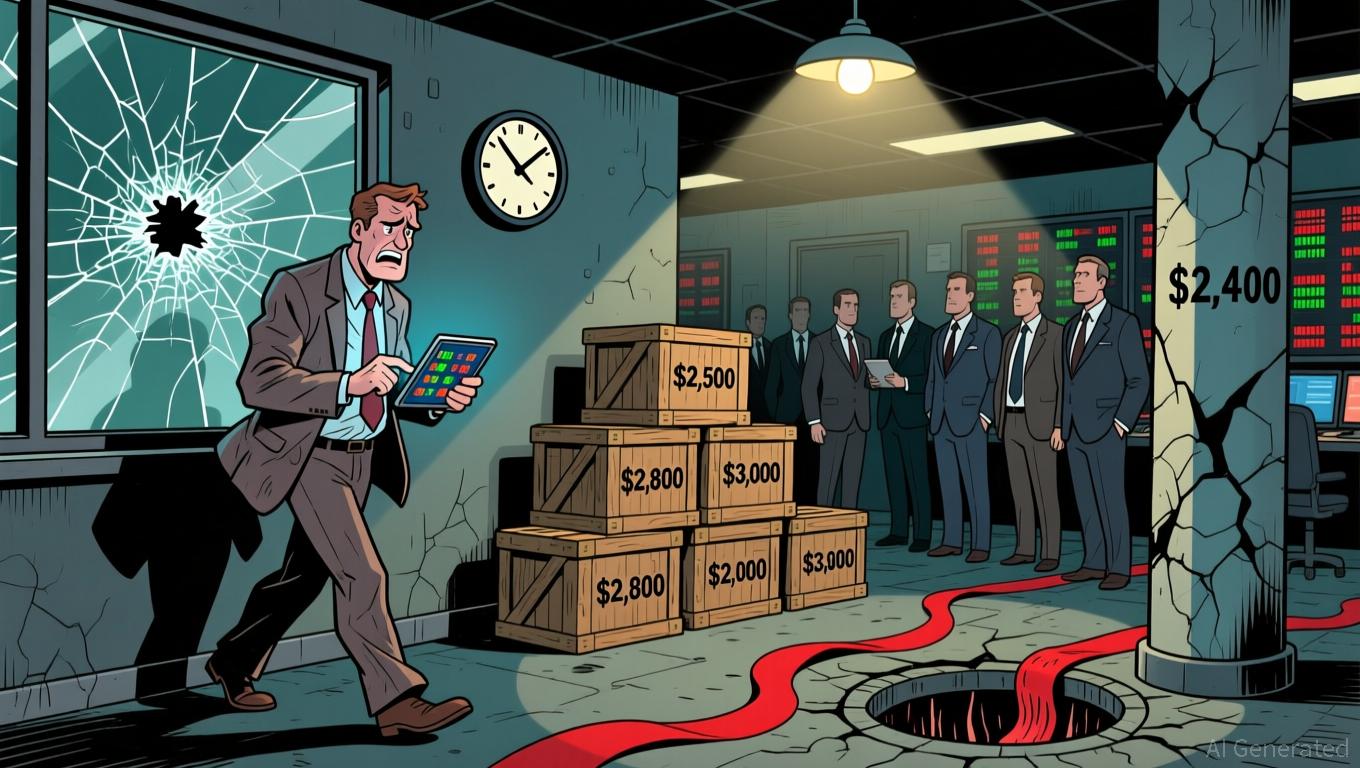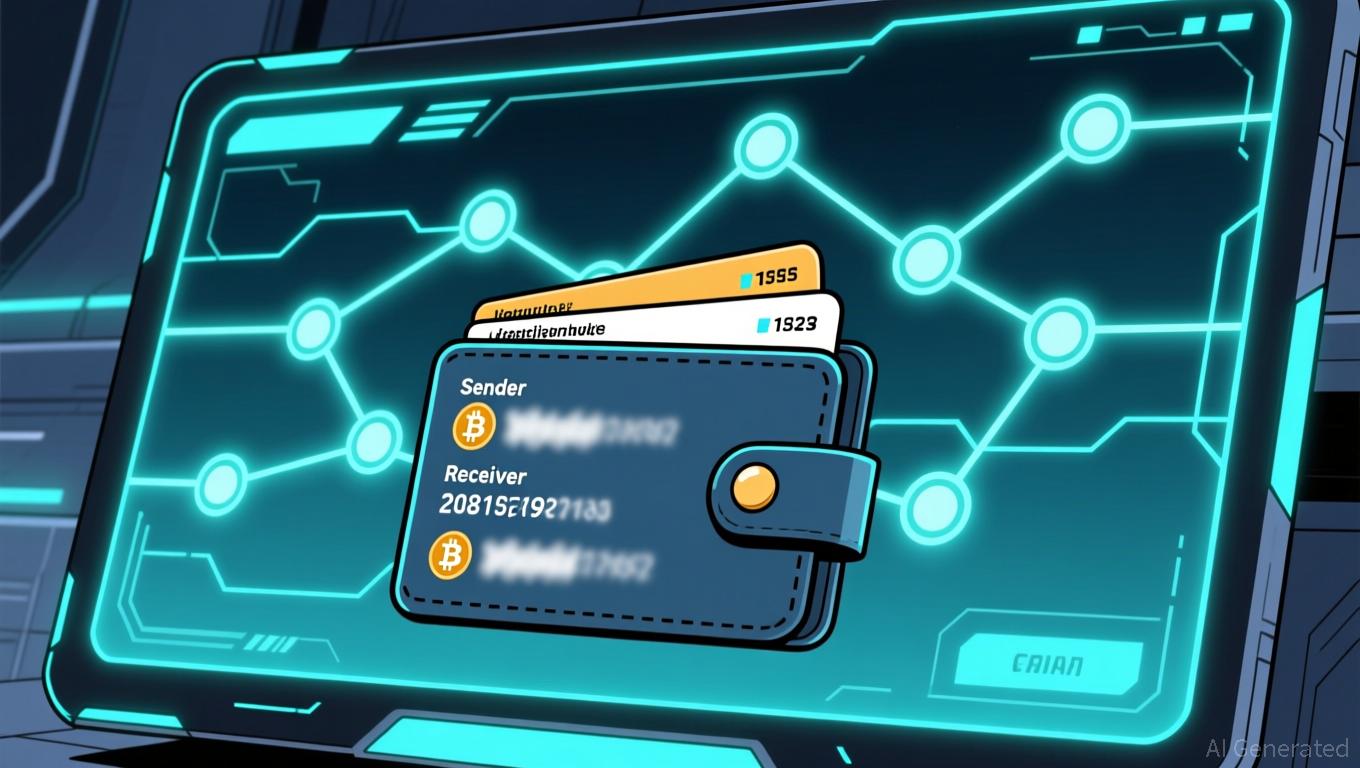Ethereum Updates: Ethereum Drops to $2,800, Prompting Surge in Demand for ZKP's Hardware-Based Presale
- Ethereum's price fell below $2,800, triggering $6.5M liquidations and testing critical support levels amid declining on-chain demand metrics. - Institutional players like BitMine accumulated 3.62M ETH (~$10.4B) despite the selloff, signaling long-term bullish conviction. - ZKP's hardware-driven presale gained traction with $17M in ready-to-ship Proof Pods and Miami Dolphins partnership for privacy-focused sports analytics. - Mutuum Finance's $19M DeFi presale and ZKP's auction model with $50K wallet caps
Ethereum Faces Intense Selling Pressure
Ethereum has recently experienced a steep decline, dropping below the $2,800 mark and challenging important support zones. This sharp movement has resulted in substantial liquidations, including the loss of a $6.5 million wstETH position when ETH slipped under $2,900. On-chain data reveals weakening demand, as the On-Balance Volume (OBV) continues to fall with no clear signs of stabilization. Despite these bearish signals, institutional investors remain engaged. BitMine, a leading Ethereum treasury, has accumulated 3.62 million ETH—valued at approximately $10.4 billion—demonstrating confidence in Ethereum’s long-term prospects even amid the downturn.
Market analysts are keeping a close watch on the $2,500 support level, warning that a breach could trigger further declines toward $2,400 or possibly as low as $1,700.

Traders Seek Alternatives Amid Ethereum’s Decline
As Ethereum struggles, investors are exploring new opportunities in the crypto space. Meanwhile, Shiba Inu (SHIB) investors are shifting their focus to Digitap (TAP), as SHIB’s price performance continues to lag behind expectations.
Zero Knowledge Proof (ZKP) Emerges as a Promising Project
Zero Knowledge Proof (ZKP), a blockchain project centered on privacy, is making waves with plans to distribute hardware devices called Proof Pods, which will be available globally. Each device is designed to validate AI computing tasks and offers the potential for daily earnings based on the device’s tier. Unlike many projects that launch without working products, ZKP’s hardware is already prepared for deployment.
The platform distributes tokens through daily auctions, ensuring fair allocation based on contributions. To prevent excessive concentration, each wallet is limited to $50,000, and the platform supports multiple assets—including ETH, USDC, and BNB—making participation more accessible.
Strategic Partnerships and Real-World Applications
ZKP’s appeal is further enhanced by its partnerships. Notably, the project has teamed up with the Miami Dolphins to integrate privacy-focused AI into sports analytics, using zero-knowledge proofs to analyze performance data while safeguarding sensitive information. Co-founder Jeff Wilck sees sports as an ideal testing ground for decentralized solutions, while Dolphins executive Terry Reader views the collaboration as a chance to modernize the team’s operations. This practical use case sets ZKP apart, offering tangible utility beyond speculation.
Shifting Market Focus: Infrastructure and Innovation
With Ethereum’s outlook uncertain, attention is turning toward projects that deliver real infrastructure and practical use cases. ZKP’s hardware-first strategy, combined with its auction-based token distribution and sports industry partnership, has led some to compare it to the next potential breakout crypto. At the same time, Ethereum’s ongoing institutional accumulation and key support levels may provide a foundation for recovery, though immediate improvement appears unlikely. As market volatility continues, investors are weighing established assets against emerging projects.
Disclaimer: The content of this article solely reflects the author's opinion and does not represent the platform in any capacity. This article is not intended to serve as a reference for making investment decisions.
You may also like
Bitcoin Updates: IMF Warns of Widespread Risks Amid Growing Popularity of Tokenized Finance
- IMF highlights tokenized finance's efficiency gains but warns of systemic risks like smart contract interdependencies and liquidity vulnerabilities. - Upcoming Chainlink ETFs signal growing institutional adoption, with Grayscale and Bitwise advancing regulated exposure to $100B+ oracle network assets. - Analysts predict over 100 new crypto ETFs in six months, but XRP's 18% price drop underscores market volatility despite regulatory approvals. - IMF anticipates regulatory frameworks to address cross-platf

South Korea's Revamped AML Framework: Is It Possible to Balance Security with Innovation?
- South Korea's FSC overhauls AML rules to tighten crypto transaction oversight, targeting transfers under $680 and expanding pre-emptive freezes. - The crackdown follows Upbit's $30M hack linked to North Korea, prompting tax authority raids and blockchain tracking for evasion cases. - AI-powered monitoring flagged 200 suspicious accounts in 2 months, balancing automation with manual audits to detect illicit patterns. - Global enforcement remains fragmented as South Korea pushes stricter VASP registration,

"Privacy or Compliance: The Trust Challenge for Crypto in Payments and DeFi"
- Economist Saifedean Ammous critiques crypto privacy tools like Houdini Pay, arguing centralized compliance models undermine true cryptographic anonymity. - Houdini Pay's "compliant privacy" retains metadata (wallets, IPs) despite hiding onchain addresses, contrasting with zero-knowledge solutions like zkBob. - Balancer's $116M 2025 hack exposed vulnerabilities in audited DeFi protocols, highlighting risks in complex financial primitives like stable pools. - The crypto industry faces a trust dilemma: bala
